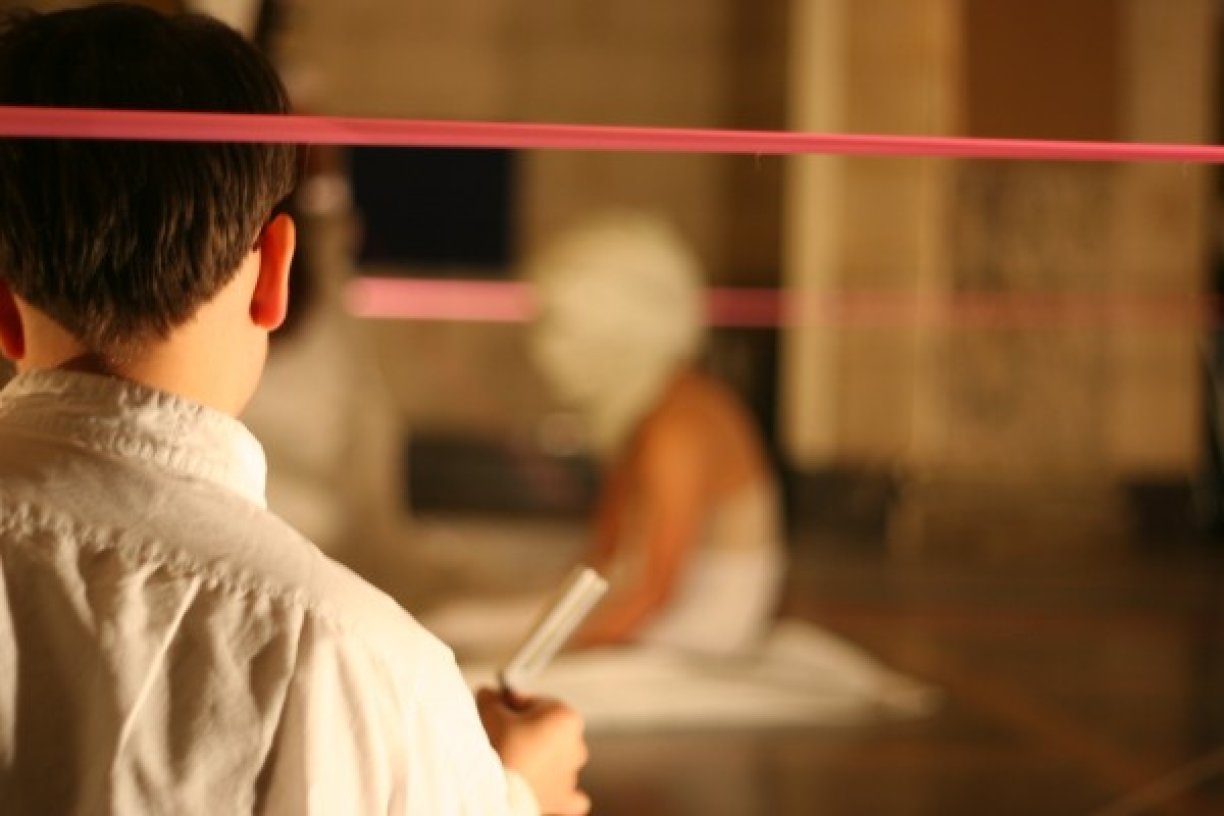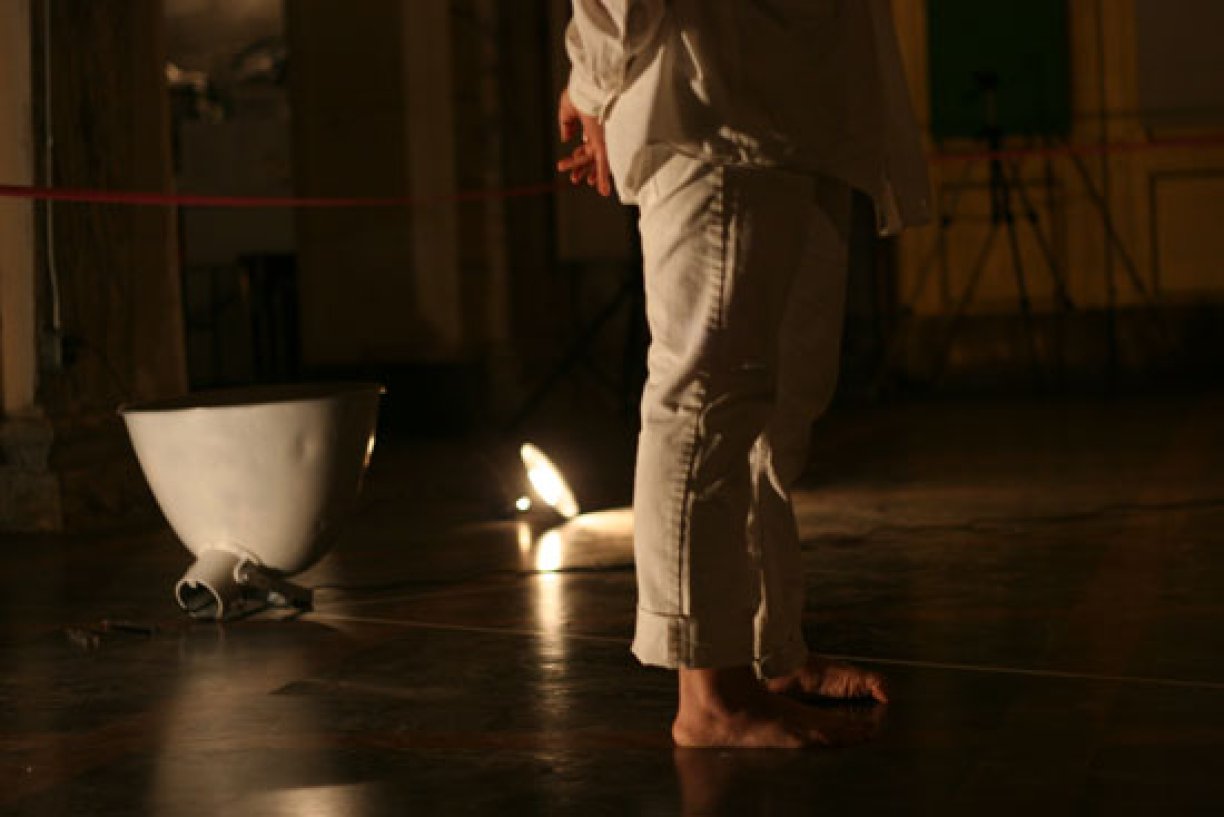Dear Jules, Why do you want so badly to title this work OR why is it frustrating to you that I keep refusing titles?
Our name is here, we are working on it, but you are resisting it. You are pushing it away for fear of it shrinking the process into a sound bite. I THINK OF NAMING AS A POWERFUL ACT that is not necessarily final or definitive, but an identity through which to face the world. Titles allow another layer of context. Words are important as they offer points of connection. Music often feels very abstract, so I use words to anchor me to a certain landscape. With WREST, my most recent major project, the actual word wrest, helped me to return to this theme of dueling violent negotiation. I would get lost, and come back to this name. A title can be a spark of recognition for everyone to toss over in their minds as they engage.
Why are you so afraid of this in-road?
Fuck titles! We are in the midst of a process we have no clue what the thing is yet and we have to call it something? Why? Is it so that people can say the name and glean something, or worse, so that we can? I say all of this admitting that titles are important to me and how I imagine and negotiate my work. Language is just as abstract as dance. WE ARE WORKING ON THE poetics, how things sound, feel, look. We rearrange, disengage, locate, falsify, transfer meaning, usurp authority, become authority. I’m interested in a title being poetry for the work, I’m fearful of describing moments or meaning or desires with language that gets written, printed, formatted, passed on and read before the experiential moment of being with the actual live work happens. Titles are funny, they are a perfect opportunity to be an asshole. It is strange that we name our children before they are born. I think this work should be called “issues at ISSUE Project Room”.
Dear Jen, what do you need?
I need openness and flexibility. I need to be able to rearrange things including the technical, physical and imaginational spaces. As raw of an environment as possible helps me see extremes and possibilities which benefits me in-process. There is something ideal about a gallery space, this idea of a white room and the lunacy it employs both in a sense of abstraction as well as heightening an artfulness of looking that is so attached to the museum and gallery. The theater does something similar, all black, it seeks to hide anything offstage, labor or tech oriented. It does the opposite of exposing which is what the gallery does, it hides. Ideally I’d be interested in building a new space for each work so that everything being seen is from the work rather than the work fitting into a space. This is where I begin the delicacy of hiding and exposing.
What is it that you need Jules?
When we started this collaboration I had an image of a saturated indigo video screen. I wanted a cello to sound like that video. I need to know where I am, who I am working with, the sounds, the textures, the instruments, and the space. The context comes first. I need to see something. I start with a set of parameters (like a cello) that allow me the freedom and flexibility to be expressive within boundaries. To locate this freedom I employ “traps”, or “blind spots” that access exploration and playfulness, often creating cracks in structures that ultimately lead to new formations. I need to be confused, agitated, or disturbed by a larger thematic concept. This problem ends up being the hook, the loose thread that perplexes me and inspires my work.
Can you speak to improvisation and your values within the spectrum of composing.
How do we seemingly know with our full history of being what we are most likely to do, what we are supposed to do, and then do something different? It is hard to break patterns. Improvisation is coming to terms with the futilities of plans. It is a daily practice, especially in a city like New York. You have to be flexible, and think on your feet. I am not someone who can send musicians a score, and then they play the show. Why do it if you know what is going to happen? My information comes from a responsive rehearsal process. Through playing and listening, space opens and the work changes. It is impossible for me to differentiate improvisational practice from non-improvisational practice because they all come from the same place; being responsive and open to the needs and desires of that specific moment.
Improvisation is everything. I hated dance improvisation when I was younger, I didn’t understand why you wouldn’t want to set a score. I wasn’t totally convinced that performing or choreographing was about establishing a set agenda either. It took me time to define the existence, use and method for my own practice. I don’t isolate or allocate moments for improvisation to happen amidst insanely counted and phrased sections, that always feels jarring in terms of watching or crafting work. Improvisation is a culture, an approach, something soft with room for sharp but more radically it unsettles the fixed states of any extremes. It has become my movement practice, my training, my academia through which I understand all things. It is a truly active place for the body to locate sensation and information rather than relying on memorization and learned behavior. Crafting work over time has become about locating an improvisatory sensibility rather than an aesthetic. It is everything.
I don’t always know what this relationship between myself and making dance is. The elements argue with each other all the time. I’m lazy and I like to work hard. I’m very sensitive and I don’t care what most people think. I could do with less automatic, unquestioned sentimentality and I cry during most movies. I make work with friends who I care deeply for. I’m trying to find ways to pay them. I expect a lot from them. I want us all to work with deep care and consciousness. I want my friends to feel like they can tell me when I need to soften a bit.
I’m stubborn and I like to control situations and make sure that I am comfortable and I’m obsessively anal about space and our experience within it.
Sometimes it feels like we are having two different conversations on two different planets. Like when we argued about the meaning of the word structure; one of us was convinced we needed to have one, while the other was talking about building houses. Collaboration is hard. A relationship within art-making is similar to a romantic relationship. Each thrives on the contrasting elements and temperaments of the person you are in relation with. I am drawn to people who seem to possess something foreign, something I can’t pin down. There is no real safety when you enter into truly intimate relationships; the potential to be hurt is always there. If it feels supportive but hard, you are probably in a good place. This uneasiness and uncertainty is important, it keeps us on our toes, and hopefully keeps our work honest.
The conflict between broad acceptance, and critical discernment is a place where I often find myself stuck. I am a critical person by nature. Sometimes this works to my benefit and allows me to see through certain types of spoon-fed illusions. At the very least, I am compelled to question their authority. This is part of being queer; an outsider’s view. Being prone to question authority also goes hand in hand with my own needs and desires for control. My work is an arena where I watch these battles occur. Composition gives an illusion of safety, of knowing. This is something, a little world, that I made. Through collaboration, that world gets stepped on, trampled, mucked up. This is good. This is why I seek collaborative experience.
Collaboration is a relationship to something which kind of means everything and nothing all at the same time. Inside of this relationship there can be inequality, demands, control, fear, frustration, ego, anything. It is about showing up, listening, relating, learning when to let go of ideas and when to put a foot down. I don’t know if you can evaluate when the thing is working or not. I think some might say through ease but what I’m interested in cultivating is not easy.


